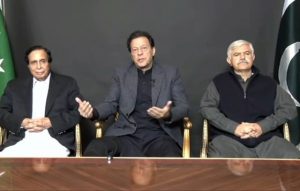Back-channel talks could salvage the government of the PTI, but the governor of Punjab is considering de-notifying the chief minister for failing to take a vote of confidence in accordance with Article 130. (7)

ISLAMABAD: Because Chief Minister Pervaiz Elahi, a supporter of the PML-Q, failed to pass a vote of confidence in compliance with Article 130(7) of the Constitution, Governor Balighur Rehman, a PML-N member, is considering de-notifying Elahi.
Elahi will go on working up until a new chief minister is elected in the event of de-notification. His cabinet members will be fired, nevertheless.
According to a senior government official, the governor might change his mind if an agreement is reached through back-channel negotiations. The continuation of the Punjab Assembly is our main goal, he continued.
According to a senior PTI leader, CM Elahi would request legal advice from the advocate general’s office in the event that the governor issued a de-notification order.
The chief minister will also reject the governor’s order, he continued, if the advocate general rules that it is unconstitutional.
The senior leader responded that his party will not petition the court in response to the question of whether or not the PTI would contest the de-notification. He advised the governor and the opposition in Punjab to go before the court if they so desired.
According to information obtained, the PTI was lacking the backing of six MPAs in the Punjab Assembly. The PTI officials, however, insist that there was no problem with the number of members in the provincial parliament.
In Punjab, there has been unrest since March. Elahi, the speaker of the Punjab Assembly, first delayed the selection of the chief minister. Later, the Lahore High Court’s orders were followed, and the election was held.
The PTI and PML-Q then challenged the election’s outcome. The governor of Punjab at the time declined to appoint Hamza Shehbaz as the new chief minister.
Raja Pervez Ashraf, speaker of the National Assembly, afterwards gave his oath to him in accordance with instructions from the LHC.
The majority decision of the Supreme Court in May said that the votes of defecting parliamentarians will not be counted since doing so would be against Article 63 (A) of the Constitution.
The Constitution was rewritten by three judges in this SC order, which legal experts describe as the worst decision of this year.
Even two judges have expressed opposition to it.
The Election Commission of Pakistan (ECP) then removed PTI lawmakers who had defected from the party.
On a PTI petition, the top court once more interfered before the by-elections.
After the by-elections, a schedule was released for the chief ministerial election.
Elahi was chosen as the next chief minister after the PTI won the majority of the seats in the by-elections.
Imran Khan, the leader of the PTI and former prime minister, has now declared that the Punjab Assembly will be dissolved on December 23.
It is well known that CM Elahi opposes dissolving the assembly for a variety of reasons.
He did, however, conditionally agree to disband the assembly with the PTI.
The PTI and PML-Q are now in talks over a seat adjustment mechanism for Punjab’s upcoming general elections.
Legal authorities claimed that political discussion may end the issue in Punjab.
They underlined that the participation of the higher courts was not a long-term fix.
The PML-N should give conducting general elections some thought.
Similar to this, Imran should consider the precedent his party was setting.
He had the option of waiting until the general elections, which were scheduled for the following year.
According to some PML-N attorneys, the PTI leader was hurried to avoid being disqualified.
Political observers claimed that the PTI has so far failed to keep amicable ties with influential groups, who also opposed the dissolution of any assemblies, as stated by CM Elahi in a recent interview.
A PTI leader revealed that Elahi had advised the Imran-led party to hold off on dissolving the assembly right away and instead try to rebuild friendly ties with influential groups similar to those it had before the 2018 general elections.
According to PTI leader Fawad Chaudhry, the president can take action against the governor if there is any criminal activity.
The governor cannot be punished by the president, according to constitutional scholar Chaudhry Aitzaz Ahsan.









































